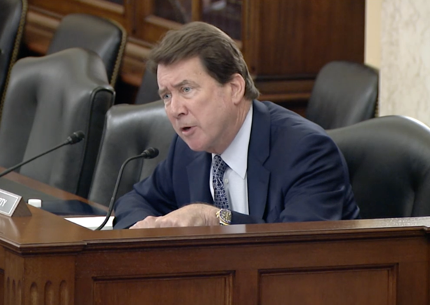Senator expressed shock at witnesses’ evasiveness and denial of facts
WASHINGTON—United States Senator Bill Hagerty (R-TN), a member of the Senate Rules Committee, today pressed Damon Hewitt, President and Executive Director of the Lawyers’ Committee for Civil Rights Under Law, and Tammy Patrick, Senior Advisor at the Democracy Fund, on past statements that 2021 changes to Georgia’s election laws restricted voter access, which have proven inaccurate.
Following passage of the 2021 Georgia election laws, Hewitt characterized the law as “limiting access to early voting,” despite that the law expanded early voting access. Hagerty contrasted Hewitt’s past claim with actual data from primary elections transpiring in the state today. “We’re currently in the third week of early voting in Georgia, and they’re seeing record early voting. In fact, early voting is up 217 percent from the last midterm election, and it’s even up 155 percent from the 2020 Presidential primary,” Hagerty said.
In response to Hagerty’s inquiry regarding whether he still believes his initial claim to be true, Hewitt evaded the question, saying they are “still analyzing numbers that are coming in” and inaptly claiming that voters are “restricted from being able to do what they once did.”
Pressed by Hagerty, Hewitt again dodged the question, refusing to abandon his stance that the new law “was designed to clamp down on a particular means of voting,” despite current primary election data showing that the laws are having the opposite effect.
Following testimony from Patrick describing “misinformation” as being unintentionally false information, “disinformation” as deliberately misleading information, and “malinformation” as information that’s used out of context, Hagerty asked if saying that the Georgia voting laws—which indisputably expanded early voting to require 17 days of early voting, at least two Saturdays of early voting instead of one, and a county option to offer Sunday early voting—reduced access to early voting would be considered misinformation or disinformation.
Like Hewitt, Patrick evasively responded, only repeating definitions to the terms, suddenly seeming unable to analyze these concepts, and saying the statement would need to be reviewed. When asked by Hagerty a second time, despite discussing these concepts in her testimony, Patrick stated she is not “qualified to make such a statement.”
Hagerty then questioned Patrick on a statement made by President Biden regarding the same Georgia election law, which allows counties to have polls open between 7:00 AM and 7:00 PM. “President Biden claimed that… ‘It’s sick, deciding that you’re going to end voting at five o’clock. Among the outrageous parts of this new state law, it ends voting hours early so working people can’t cast their vote after their shift is over.’ […] So, Ms. Patrick, would you characterize this statement by President Biden as misinformation or disinformation or malinformation?” Hagerty asked.
Patrick admitted that the statement was not accurate, but avoided discussing whether the inaccurate statement was “misinformation” or “disinformation”, stating that she doesn’t “ascribe motivations to individual statements by anyone” and is “not a specialist in Georgia’s law.”
“The doublespeak here is shocking, but the motivation, I think, is clear: it’s to inflame. I think it’s shameful,” Hagerty concluded.

###